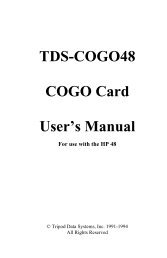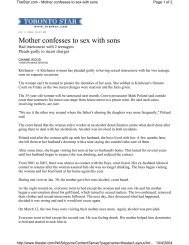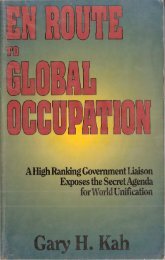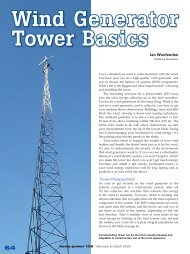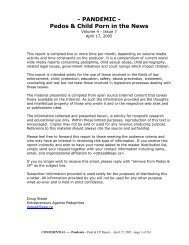G. Edward Griffin - The Fearful Master - PDF Archive
G. Edward Griffin - The Fearful Master - PDF Archive
G. Edward Griffin - The Fearful Master - PDF Archive
You also want an ePaper? Increase the reach of your titles
YUMPU automatically turns print PDFs into web optimized ePapers that Google loves.
in November of 1957. This group discussed the "deplorable" free and public discussion<br />
among scientists of questions which are controversial. <strong>The</strong>y declared: "<strong>The</strong> publicizing of<br />
disagreements and contradictions among scientists, for example, about polio vaccine, or<br />
the cancer-producing effects of tobacco" has contributed to public mistrust of scientists<br />
and has caused science to lose "the infallibility with which it was credited in the nineteenth<br />
century." 7<br />
What kind of information would United Nations officials decide is "accurate, objective and<br />
comprehensive?" Conor Cruise O'Brien gave us a hint when he wrote:<br />
. . . I referred [UN] headquarters to statements which I had indeed made<br />
during the fighting [in Katanga], but in the latter days of it, when it had<br />
already been impressed on me, by the telegrams from Leopoldville, that<br />
talk about ending the secession was frowned on. <strong>The</strong>se statements<br />
were naturally more guarded and nuancé than my first statements. . . . I<br />
also referred them to an interview I had given Keith Kyle, for the BBC.<br />
Khiary [UN official], who was in Elisabethville at the time, asked whether<br />
it was an "orthodox" interview. . . . And smiled the smile of a man who<br />
knows that all official versions are, have been from the beginning of<br />
time, and will forever be, worded to deceive the enemy and appease the<br />
clamor of the ignorant. 8<br />
And, if there is any lingering doubt as to what the United Nations has in mind when it says<br />
it may impose "penalties, liabilities and restrictions" on the right to transmit information,<br />
ponder the following news item that appeared in the New York Times during the United<br />
Nations December 1961 attack on Katanga:<br />
Asked why a UN jet attacked the post office in Elisabethville with<br />
rockets yesterday, General McKeown replied that the air strike had<br />
been ordered because the building had been used to transmit anti-<br />
United Nations propaganda.<br />
If it were not so tragically serious, the following extracts taken from a recent issue of the<br />
United Nations Review would certainly be good for a laugh:<br />
A United Nations Regional Human Rights Seminar was held in<br />
Canberra from April 29 to May 13. Several speakers termed wiretapping<br />
a "dirty business," and the seminar agreed that it was a serious<br />
infringement on human rights-- in particular, the right to privacy.<br />
Indiscriminate and uncontrolled wire-tapping was unanimously<br />
condemned [apparently discriminate and controlled wire-tapping is not<br />
objectionable]. . . . Wire-tapping for criminal investigations should be<br />
permitted only by law, and only to combat particularly heinous crimes<br />
committed so clandestinely that such a practice was absolutely<br />
necessary. . . .<br />
A majority at the seminar agreed that national compulsory fingerprinting<br />
of all citizens did not infringe any human rights. . . . <strong>The</strong> seminar view<br />
was that human rights could not be violated when action was taken for<br />
the good of all. 9 [Italics added.]


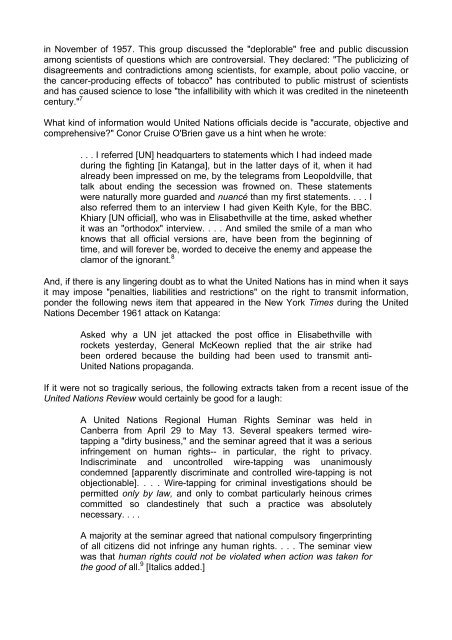
![Robert T McQuaid [rtmq@stn.net] Sent: Friday, October 29, 2004 12 ...](https://img.yumpu.com/51070071/1/190x245/robert-t-mcquaid-rtmqstnnet-sent-friday-october-29-2004-12-.jpg?quality=85)

